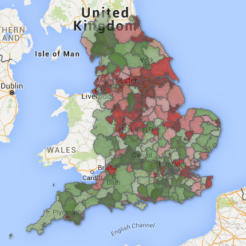There are a disproportionate number of charities being set up in "prosperous" areas of the UK where their resources are less needed, according to research by consultancy nfpSynergy.
The figures are published in a blog post by nfpSynergy’s head of data Cian Murphy, which uses the figures to call into question the Conservative government’s Big Society agenda.
"Withdrawing state funding and services and encouraging communities to fend for themselves is likely to work fine for wealthier areas, but will leave poorer areas behind," says Murphy. “Voluntary action is not capable of filling the gap in poorer parts of the country."
Murphy said an analysis of the charity register reveals that the “highest concentration of charities per head of population” is across the “prosperous south of England and wealthy rural areas”, including prime minister David Cameron’s constituency of West Oxfordshire and the Cotswolds.
There are “serious questions” raised by the government’s Big Society agenda and the idea that “communities should step in where the state has retreated”, Murphy said.
“Are those communities most affected by the withdrawal of central and local government services really the people best placed to replace these services? Can the withdrawal of tax money be replaced by voluntary action and fundraised income in communities hit by years of austerity and economic turbulence?”
He also questions if equality of access to services be guaranteed by ad hoc voluntary provision - or whether it could lead to “growing inequality as areas rich enough to provide for themselves prosper and those in already downtrodden areas are simply left behind”.
The research was conducted with a manual search for addresses using the Charity Commission’s register of charities. Data was gathered for a period dating back ten years.









